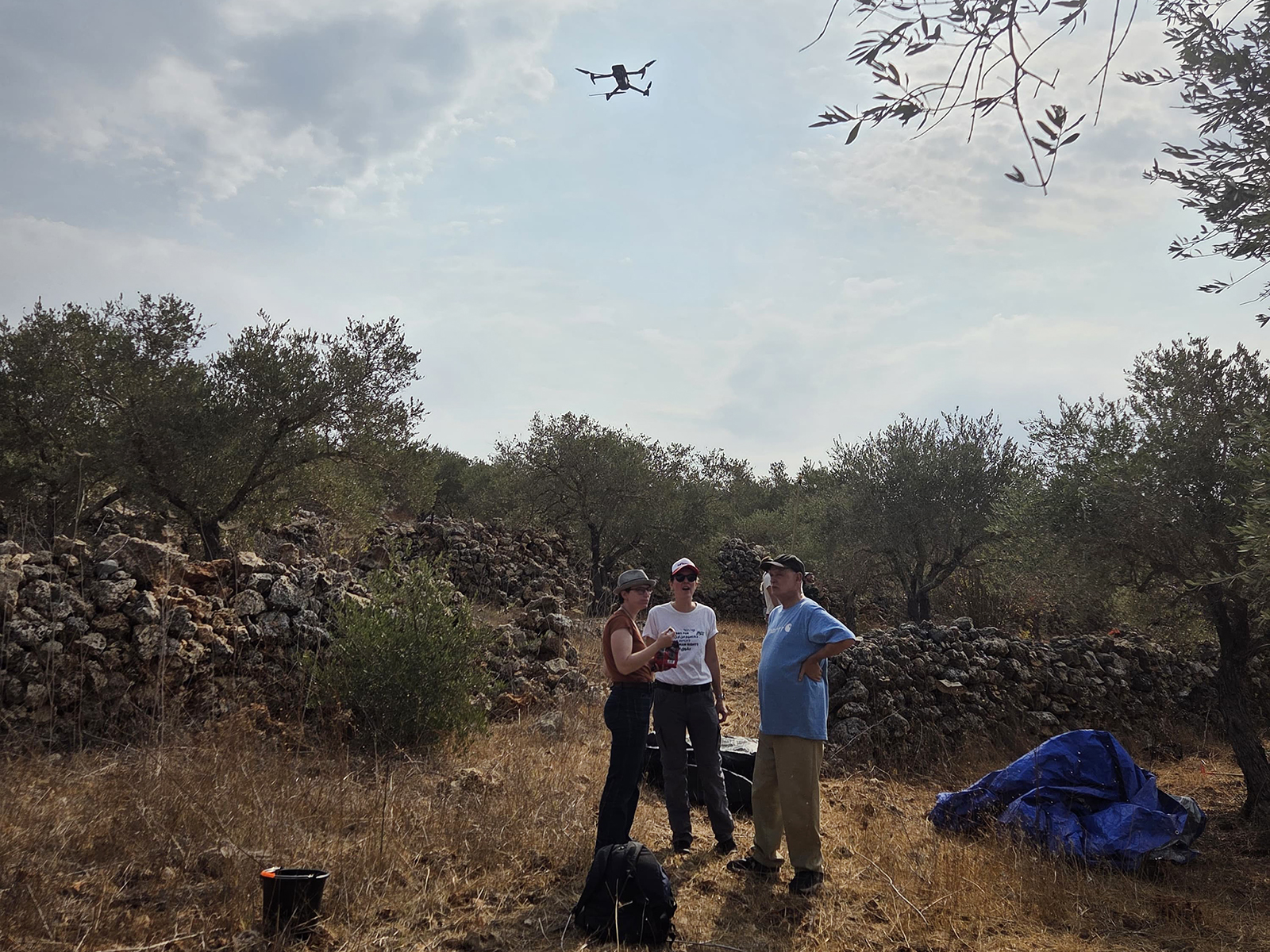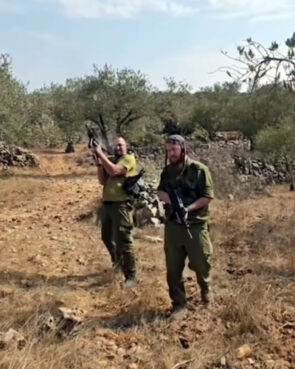
(RNS) — This past week, nine American rabbis affiliated with T’ruah, the rabbinic human rights organization I lead, joined the Israeli organization Rabbis for Human Rights for three days of protective presence, accompanying Palestinian farmers and shepherds to deter violence by Israeli settlers.
On our final day, we spent the morning helping a family pick olives on their land near Deir Istiya in the West Bank. As we worked, a drone buzzed overhead, presumably capturing photos and video. But as the hours passed, it grew more aggressive, dropping to eye level and hovering inches above our heads.
Suddenly it fell, striking an Israeli rabbinic colleague hard in the arm and tearing a deep gash through her skin. We don’t know whether the drone operators attacked her deliberately or lost control. Medics rushed her to the hospital for stitches while volunteers called the police to report the incident. The police never arrived.
Minutes later, two armed men in Israel Defense Forces uniforms charged down the hill into the crowd to retrieve the drone. We parted to let them through. Though they refused to identify themselves, we believe they were members of a nearby settlement’s local defense body.

Armed males retrieve a drone from a Palestinian farm in the West Bank. (Photo courtesy of T’ruah)
As they retreated, the uniformed men faced the crowd and pointed their guns at us. One fired into the air — thankfully without hitting anyone — and the two fled.
Soon, a third man, a leader of the settlement defense body, arrived flanked by soldiers, claiming we had stolen the drone and assaulted the men who came to retrieve it. We showed the soldiers our footage, the settler leader apologized, and we left the area without incident.
We were lucky. Since the outbreak of the war between Israel and Hamas, as worldwide attention turned to Gaza, violence in the West Bank has skyrocketed and has included regular vandalism, violence and land grabs. Palestinian farmers and shepherds, like the ones we accompanied, are subject to near daily attacks and are regularly prevented from reaching their land. During this year’s olive harvest, which began in October, the United Nations Office for the Coordination of Humanitarian Affairs documented 86 incidents of harvest-related violence, injuring 112 Palestinians and harming 3,000 trees and saplings.
The family whose olives we picked had previously not been able to access their trees at all this harvest season. If our group had not consisted of American and Israeli rabbis and activists, it is likely that day could have ended with serious injuries or fatalities.
The current Israeli government — the most extreme in the country’s history — is quickly enacting the agenda of the settlement movement, which seeks to exert control over the entire West Bank and Gaza, and to pack Palestinians into disconnected and suburban areas. In May 2024, I brought a group of rabbis to visit the West Bank village of Khirbet Zanuta. Its Palestinian residents had recently been chased out by local settlers, who then destroyed the village to prevent Palestinians from returning. We stood in the rubble of a former school with shredded learn-to-count posters at our feet.
A few months later, in December 2024, I returned to the ruins of Khirbet Zanuta with a different group of rabbis. In the meantime, the Israeli Supreme Court had ordered that the villagers be permitted to return. But when Palestinian residents, along with Israeli activists, returned to rebuild the village, settlers chased them out again, Supreme Court order notwithstanding. With the army unwilling to protect the village, legal decisions have no force. Since then, the Supreme Court again ruled that residents may return, but few dare risk their lives to do so.
Settlers carry out their attacks with virtual impunity. According to the Israeli human rights organization Yesh Din, even when police do investigate settler violence, about 94% of cases end without an indictment. Based on this experience, in more than 60% of cases documented by Yesh Din between January 2023 and the end of September 2024, Palestinian victims choose not even to file a complaint. Just this week, dozens of settlers rampaged in a Palestinian industrial zone, burning buildings and trucks and wounding Palestinians and even IDF soldiers. Only three of the rampagers have been arrested as of this writing, with only one remaining in custody.
This violence is not inevitable. In the long term, Israel, the Palestinian leadership and the international community must take concrete steps to bring about a two-state solution in which both Israel and a future state of Palestine will have defined borders and responsibility for their own civil and security affairs. In the short term, Israel can enforce its own laws, actively investigate settler violence incidents and bring perpetrators to justice.
But in the current Israeli government, there is little appetite for doing so. In response to journalists’ inquiries about the attack on our group of rabbis last week, the IDF released a statement decrying the “unusual” and “unprofessional” behavior of the perpetrators and pledging to investigate. Ultimately, the man who fired the shot was dismissed from reserve duty and the other man was reprimanded. This response was important, but also highly unusual. We know that the only reason the IDF even issued this statement of concern was because an Israeli rabbi was injured, and both Israeli and American rabbis were present.
The United States government can play a major role in curbing settler violence. Under the Biden administration, sanctions against individual actors and organizations succeeded in cutting off some of the most violent settlers and their organizations from being able to access funding. When President Donald Trump’s administration canceled these sanctions, these violent actors regained full reign. Yinon Levi, one of the first settlers sanctioned by Biden, was subsequently identified by Israeli authorities as the suspect in the killing of Awdah Hathaleen, a Palestinian peace activist, in his home village this July. After a brief detention, Levi remains free, with no legal consequences.
The West Bank Violence Prevention Act, introduced in the U.S. House by Rep. Jerry Nadler and in the Senate by Sen. Cory Booker earlier this year, seeks to restore the crucial Biden-era sanctions to prevent the kind of violence that my group experienced last week, and that Palestinians experience nearly daily. The legislation would also apply to Palestinians who commit acts of violence. Congress should support legislation that would further the foreign policy goal of two states and reduce instability in the region.
Moments before a drone hit and injured our colleague, our group of American and Israeli rabbis was discussing the biblical verse in which God declares, “The Land is Mine; you are but strangers resident with Me” (Leviticus 25:23). Over and over, the Torah warns of the dangers and responsibilities of sovereignty. Possession of land is not an end unto itself, but rather a means of fulfilling the mission of building the just society that God envisions. West Bank settlers, enabled by an extremist government, have forgotten this lesson and instead employ force to assert themselves as the ultimate owners of the land. Curbing their violence is a first step toward creating a future in which all residents of the land can live with dignity and justice.
(Rabbi Jill Jacobs is the CEO of T’ruah: The Rabbinic Call for Human Rights, a membership organization of more than 2,300 rabbis and cantors. The views expressed in this commentary do not necessarily reflect those of Religion News Service.)
